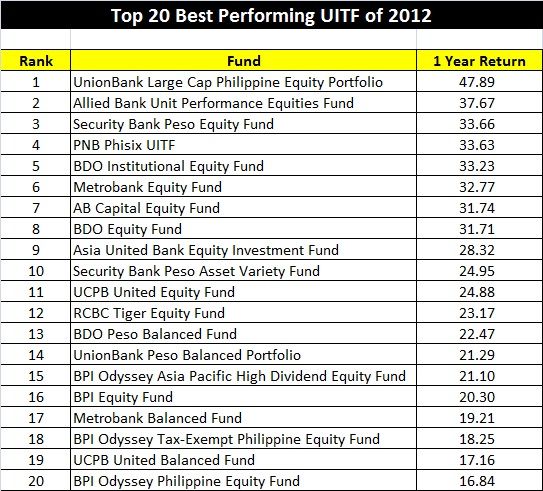Top 5 mutual funds in the last 5 years
By Randell Tiongson on August 10th, 2015
There has been a lot of anxiety with what’s happening in the equities market. External forces have affected the local bourse and many investors are jittery. China, Greece and a slowing down of the economy has largely contributed to some declines lately.
The equities market are behaving the way it is supposed to behave, it goes up and down and it is largely sentiment driven. How about mutual funds? Are the fund managers doing their jobs in ensuring growth in their funds despite the volatility?
I recently checked out how the mutual funds are doing and I am happy to note that while the short term gains are very minimal, even losses for some funds, many funds are doing admirably when you look at them from a long term perspective… say 5 years. I have always subscribed to the belief that investing in the stock market is more about time and less about timing — time in the market is better than timing the market. Of course many traders will disagree but my purpose of going into the equities market has always been from an investors perspective and not of a trader.
When investing in pooled funds like mutual funds or UITF, it is best that you do so with a long term perspective — the longer you stay, the better it is! I recommend that you stay invested in your funds for as long as you can, and you only redeem them when you have already hit your objective. It is always best to know what your investment objectives are, as well as your time frame and risk tolerance. Once you have established them and invested your money, don’t react too much with how the market moves and always view your investments from a long term perspective. It will make you less jittery and it will keep you sane, trust me!
Below is a summary of the top 5 mutual funds in the last 5 years. Always remember, however, that past performance is not an indication of future performance — today’s top performer can be tomorrow’s laggard. A strategy I use is peso cost averaging — I invest in a monthly basis regardless of where the market is. But, whenever the market dips and I have investible funds, I try to buy more. It may not be the best strategy but it is a strategy that works for me. Of course, always remember to diversify your investments.
Happy investing!

Stocks or Stock Funds?
By Randell Tiongson on February 9th, 2015
 QUESTION: I am ready to start investing and I would like to invest in equities. Is it better to invest in stocks directly or through pooled stock funds like UITF or mutual funds? —Name withheld per request, asked via e-mail
QUESTION: I am ready to start investing and I would like to invest in equities. Is it better to invest in stocks directly or through pooled stock funds like UITF or mutual funds? —Name withheld per request, asked via e-mail
Answer: As a financial and investment planner, we need to subscribe to the principle of suitability. Without sufficient information, it wouldn’t be prudent of me to categorically say one would be better than the other. The answer really depends on you—if you are knowledgeable enough to select your own stocks, size of funds, and if you have enough time for investing.
However, to help you make a more informed decision, let’s discuss the advantages and disadvantages of both types of investing.
On individual stocks
Advantages :
Control—Buying your stocks directly gives you control over what and when to buy or sell.
Residual income—If you buy a stock with a good dividend payout, then you don’t have to watch the price movement anymore. As long as the company is earning and declares dividends, you will get dividends.
Maximized returns—individual stocks that are growing may beat the market and can give you better-than-average returns. Many stocks beat the index last year.
Potentially better returns—with proper selection and assuming that you are very good at selecting market performers, the growth of your own stock portfolio can outperform the stock market index and many stock funds.
Fees—buying your stocks directly from brokers usually means lower fees as fund managers charge a higher investment management fee compared to stock brokers.
Disadvantages :
Time-consuming—before investing, you should spend enough time thoroughly understanding how stock market investing works. You should also accumulate enough knowledge of both fundamental and technical analysis. Fundamental analysis means you must be able to read and understand financial reports of the companies you would like to invest in, the general condition of the industries and market trends to which these companies belong to, general knowledge of macroeconomics and even the management of the corporations you would like to own shares of, etc. Technical analysis will require you to constantly study charts on price averages, trading volumes and a multitude of technical market theories like Dow theory, Relative Strength Index, Elliott Wave theory and more. While fundamental and technical analysis is not rocket science, it takes considerable time for you to learn them properly. Enrolling in a class like Marvin Germo’s Stock Smarts is a good way to start.
Diversification—all investment professionals will always recommend you to diversify. No amount of study and good performance in the past will guarantee the performance of a particular stock in the future so having several and properly selected stocks is always a prudent thing to do. Unless you have a very big capital for investing, you will be limited to the variety of stocks you can carry in your portfolio.
On stock funds
Advantages :
Professional fund management—this is perhaps the biggest advantage of pooled funds like UITFs and mutual funds. There is a dedicated team of investment experts that looks at investment opportunities and is investing the money according to the investment objectives of the fund. It is common to see CFAs or Certified Financial Analysts leading or being part of these investment teams. Good fund managers are clinical and logical investors and are not easily swayed by emotions as compared to individual investors.
Capital requirements—most of pooled stock funds have low capital entry requirements. One can invest in a fund for as low as P 5,000 to P10,000, with other providers requiring a monthly contribution of as low as P1,000 per month.
Diversification—all stock funds carry well-diversified stocks in their portfolio, usually blue chip or premium stocks. Since these are pooled funds, there are economies of scale in place; fund managers will be able to purchase different shares. Proper diversification will ultimately result in reduced portfolio risk.
Disadvantages :
Fees—While not all stock funds charge the same range of fees, these fees are usually much more than broker fees as there are costs involved in managing funds. Some funds even charges entry and exit fees, which can reduce the returns of your investments. Some funds are being sold through agents and advisors and commissions would need to be paid to them.
Control—you have no say on which funds you want or don’t want in your fund as this is already delegated to the fund managers. You also can’t modify the weight of the stocks inside a stock fund as fund managers follow maximum exposure limits per stock to ensure proper risk management practices. Even if you want more PLDT or Jollibee shares in your portfolio, your fund will only have a limited exposure to said stocks, like 10 percent.
The answer to your question is dependent upon you knowing the pros and cons of individual stock investing or through a pooled equity or stock fund. If you are a new investor, I recommend you invest in a stock fund first and as you get to understand how the stock market works and develop your competency in investing, you may want to start investing in individual stocks. There are no perfect investments and there are many ways to build your wealth, chose a strategy that you will be most comfortable with.
Do not forget, whether investing in stocks by yourself or through a fund, it pays to invest first in investment education.
The best performing UITFs in 2012
By Randell Tiongson on January 25th, 2013
Are you considering investing in UITFs?
UITFs or Unit Investment Trust Funds are pooled funds offered by the trust department of the major banks of the country.
But what is a UITF? As per the Trust Officers Association of the Philippines (TOAP), they defined it as “an open-ended pooled trust fund denominated in pesos or any acceptable currency, which is operated and administered by a trust entity and made available by participation. Each UITF product is governed by a Declaration of Trust (or Plan Rules) which contains the investment objectives of the UITF as well as the mechanics for investing, operating and administering the fund. Most UITFs are considered medium to long term investments. Clients considering to invest in UITFs must have the financial resources to stay invested in them for a reasonable period of time in order to maximize earnings potentials. If the funds to be invested will be needed by the client in the immediate future, the UITFs may not be a suitable investment vehicle for such client.”
UITFs are very good investment instruments for investors with a longer time horizon and are comfortable with the volatility typical of pooled funds. Pooled funds can be high risk when invested in equities, low risk when invested in fixed income (bonds) or moderate when invested in a balanced fund.
Before jumping into UITFs, it is best that you understand the nature of this instrument. Further, it is advisable that you check on the fees associated with pooled funds — they are not all the same. Some funds require entry and exit loads and some funds have higher management fees. Fees will ultimately affect your yields.
2012 was a good year for investments, particularly for equities so it is expected that equity UITFs will do really well. I need to caution readers, however, that returns are not the sole factor if selecting a fund. Aside from fees, it will be good to check on how volatile the funds are, experience of the fund manager and size of fund. Bigger funds are usually less volatile but may not have the best performance. Further, equity funds that are more diversified and having more variety in the fund is generally less risky. Let’s compare two funds even if they are both equity funds — a fund that is invested in only 10 companies might perform better than a fund that is invested with 20 to 30 companies since certain calls are easier to make. However, the fund with fewer companies are riskier since one bad call of the fund manager can have a large impact on the fund.
My advise — talk to your bank and do your homework. Regardless, I am a fan of UITFs because in the long run, these investments will help me achieve my financial goals. Personally, I go with bigger sized funds that offers the lowest fees offered by the larger and more stable banks.
To know more about UITFs, please read my earlier blog HERE. You can also check out performance of Philippine funds at Bloomberg’s SITE.





